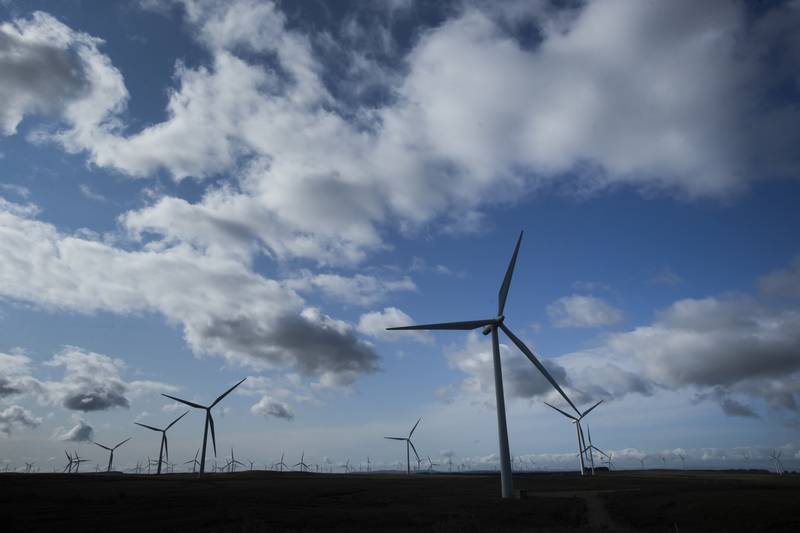Renewable energy investment to outstrip oil and gas spending in 2022, Rystad says

Capital investments in renewables are set to outstrip oil and gas projects for the first time in 2022 as high power prices prompt countries to further diversify their energy mix, Rystad Energy said in a report on Thursday.
The high spot electricity prices, resulting from Russia’s curtailment of natural gas to Europe, will shorten the payback period on renewable energy projects to “12 months or less” in Germany, France, Italy and the UK, the Norway-based consultancy said.Read More : Masdar finalises funding for utility-scale wind farm in Uzbekistan Capital investments in renewables have also increased “significantly” and are set to reach $494 billion in 2022, outstripping upstream oil and gas at $446bn for the year, said Rystad.
As countries “scramble” to source secure and cheaper energy supplies, investments into renewables are expected to increase further, said Michael Sarich, senior vice president at Rystad Energy.
The high gas price caused by Russian cuts has pushed up the market rate for electricity, generating excess profits in coal, nuclear, wind and solar generation despite producers being less affected by the increase in gas costs.
On Wednesday, the UK government said it was considering a cap on revenue from renewable energy generators and nuclear power plants to prevent them from cashing in on record-high energy prices.
European electricity prices rose to record highs of €1,500 ($1,455) a megawatt hour in the summer due to plant shutdowns, a heatwave and reduced gas deliveries from Russia, the region’s biggest supplier.
Prices retreated to €300 to €400 a megawatt hour in August.
“The relatively low operating costs of renewables strengthens their case as the returns would remain robust even if the long-term power prices were to drop significantly,” Rystad said.
If high prices are to stay, developers and investors should try to ensure their projects are up and running “as quickly as possible,” said Rystad.
French utility company Engie intends to have a renewable energy capacity of 80 gigawatts by 2030, from 35 gigawatts at present, as it plans to extend its global clean energy portfolio.
The company is planning to start new projects in Europe, the US, the Middle East, Africa and Australia, Frederic Claux, Engie’s country manager for GCC and Pakistan, told The National on the sidelines of the World Green Economy Summit in Dubai last month.
“Up until now, returns on renewable energy projects have been unspectacular, primarily relying on subsidies to get projects over the line,” Rystad said.
If developers bring new capacity online quickly, the “compelling” economics might even hasten Europe’s renewable sector growth, the consultancy said.
Earlier this year, Rystad said that global energy spending would reach a record $2.1 trillion in 2022, led by oil and gas, as well as rising power prices and the EU's move to reduce its reliance on Russian imports.
The high spot electricity prices, resulting from Russia’s curtailment of natural gas to Europe, will shorten the payback period on renewable energy projects to “12 months or less” in Germany, France, Italy and the UK, the Norway-based consultancy said.
As countries “scramble” to source secure and cheaper energy supplies, investments into renewables are expected to increase further, said Michael Sarich, senior vice president at Rystad Energy.
The high gas price caused by Russian cuts has pushed up the market rate for electricity, generating excess profits in coal, nuclear, wind and solar generation despite producers being less affected by the increase in gas costs.
On Wednesday, the UK government said it was considering a cap on revenue from renewable energy generators and nuclear power plants to prevent them from cashing in on record-high energy prices.
European electricity prices rose to record highs of €1,500 ($1,455) a megawatt hour in the summer due to plant shutdowns, a heatwave and reduced gas deliveries from Russia, the region’s biggest supplier.
Prices retreated to €300 to €400 a megawatt hour in August.
“The relatively low operating costs of renewables strengthens their case as the returns would remain robust even if the long-term power prices were to drop significantly,” Rystad said.
If high prices are to stay, developers and investors should try to ensure their projects are up and running “as quickly as possible,” said Rystad.
French utility company Engie intends to have a renewable energy capacity of 80 gigawatts by 2030, from 35 gigawatts at present, as it plans to extend its global clean energy portfolio.
The company is planning to start new projects in Europe, the US, the Middle East, Africa and Australia, Frederic Claux, Engie’s country manager for GCC and Pakistan, told The National on the sidelines of the World Green Economy Summit in Dubai last month.
“Up until now, returns on renewable energy projects have been unspectacular, primarily relying on subsidies to get projects over the line,” Rystad said.
If developers bring new capacity online quickly, the “compelling” economics might even hasten Europe’s renewable sector growth, the consultancy said.
Earlier this year, Rystad said that global energy spending would reach a record $2.1 trillion in 2022, led by oil and gas, as well as rising power prices and the EU's move to reduce its reliance on Russian imports.
Source: www.thenationalnews.com
